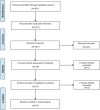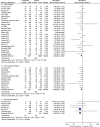Probiotics for Preventing Late-Onset Sepsis in Preterm Neonates: A PRISMA-Compliant Systematic Review and Meta-Analysis of Randomized Controlled Trials
- PMID: 26937897
- PMCID: PMC4778994
- DOI: 10.1097/MD.0000000000002581
Probiotics for Preventing Late-Onset Sepsis in Preterm Neonates: A PRISMA-Compliant Systematic Review and Meta-Analysis of Randomized Controlled Trials
Abstract
The effect of probiotics on late-onset sepsis (LOS) in preterm neonates remains controversial. The authors systematically reviewed the literature to investigate whether enteral probiotic supplementation reduced the risk of LOS in preterm neonates in neonatal intensive care units.PubMed, Embase, and Cochrane Central Register of Controlled Trials were systematically searched for randomized controlled trials (RCTs) regarding the effect of probiotics in preterm neonates. The primary outcome was culture-proven bacterial and/or fungal sepsis. The Mantel-Haenszel method with random-effects model was used to calculate pooled relative risks (RRs) and 95% confidence intervals (CIs).Twenty-seven trials were included in our review, and 25 trials involving 6104 preterm neonates were statistically analyzed. Pooled analysis indicated that enteral probiotic supplementation significantly reduced the risk of any sepsis (25 RCTs; RR 0.83, 95% CI 0.73-0.94; I = 26%), bacterial sepsis (11 RCTs; RR 0.82, 95% CI 0.71-0.95; I = 0%), and fungal sepsis (6 RCTs; RR 0.57, 95% CI 0.41-0.78; I = 0%). This beneficial effect remains in very low birth weight infants (<1500 g) (19 RCTs; RR 0.86, 95% CI 0.75-0.97; I = 18%), but not in extremely low birth weight infants (<1000 g) (3 RCTs; RR 0.73, 95% CI 0.45-1.19; I = 53%). All the included trials reported no systemic infection caused by the supplemental probiotic organisms.Current evidence indicates that probiotic supplementation is safe, and effective in reducing the risk of LOS in preterm neonates in neonatal intensive care units. Further studies are needed to address the optimal probiotic organism, dosing, timing, and duration. High-quality and adequately powered RCTs regarding the efficacy and safety of the use of probiotics in extremely low birth weight infants are still warranted.
Conflict of interest statement
The authors have no conflicts of interest to disclose.
Figures
References
-
- Stoll BJ, Hansen N, Fanaroff AA, et al. Late-onset sepsis in very low birth weight neonates: the experience of the NICHD Neonatal Research Network. Pediatrics 2002; 110:285–291. - PubMed
-
- Payne NR, Carpenter JH, Badger GJ, et al. Marginal increase in cost and excess length of stay associated with nosocomial bloodstream infections in surviving very low birth weight infants. Pediatrics 2004; 114:348–355. - PubMed
-
- Manzoni P, Rizzollo S, Decembrino L, et al. Recent advances in prevention of sepsis in the premature neonates in NICU. Early Hum Dev 2011; 87:S31–S33. - PubMed
-
- Magne F, Suau A, Pochart P, et al. Fecal microbial community in preterm infants. J Pediatr Gastroenterol Nutr 2005; 41:386–392. - PubMed
Publication types
MeSH terms
LinkOut - more resources
Full Text Sources
Other Literature Sources
Medical




